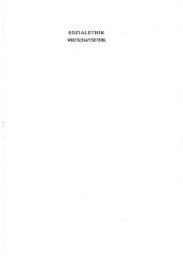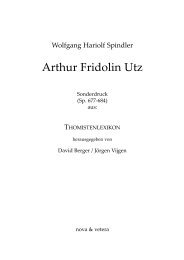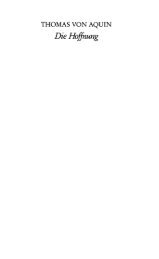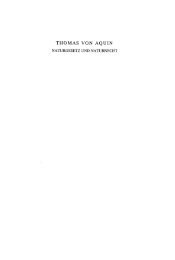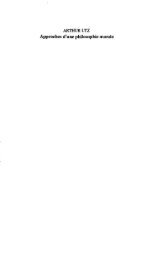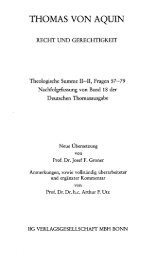Arthur Fridolin Utz - Die Stiftung Utz
Arthur Fridolin Utz - Die Stiftung Utz
Arthur Fridolin Utz - Die Stiftung Utz
You also want an ePaper? Increase the reach of your titles
YUMPU automatically turns print PDFs into web optimized ePapers that Google loves.
Wolfgang Hariolf Spindler<br />
<strong>Arthur</strong> <strong>Fridolin</strong> <strong>Utz</strong><br />
Translation of a Reprint<br />
(p. 677-684)<br />
of the 'Thomistenlexikon'<br />
('Lexicon of Thomists')<br />
published by<br />
David Berger/Jörgen Vijgen<br />
c Publishing house of the original German version:<br />
nova & vetera, Bonn, 2007
<strong>Utz</strong>, <strong>Arthur</strong><br />
<strong>Arthur</strong> <strong>Utz</strong> was born in Basle, Switzerland, on April 15 th , 1908. As new research has<br />
brought to light, he was however not, as previously thought, a Swiss national by<br />
birth, but in fact German-born to become a Swiss citizen only later on in his life.<br />
After finishing high school in Freiburg, Germany, in 1928, he joined the Dominican<br />
Order, Teutonia province, adopting the monastic name of <strong>Fridolin</strong> Maria. In 1939, he<br />
changed over into the newly founded Southgerman-Austrian province. Following his<br />
novitiate in Venlo, Netherlands, he studied philosophy and theology (from 1934<br />
onwards 'Generalstudium' - 'general studies') in the studium of Walberberg in the<br />
vicinity of Bonn. He concluded his studies with the lectorate. In 1934, he was<br />
ordained as a priest in Cologne. Taking his propensity for preaching into account, <strong>Utz</strong><br />
was trained in rhetorics and phonetics in a four-year course, equally in Cologne. His<br />
superiors however had other plans for him in mind: They wanted <strong>Utz</strong> to teach moral<br />
theology later on and therefore sent him to the University of Fribourg, Switzerland. In<br />
1937, he graduated under Spanish-born S. Ramirez O.P., whom he considered to be<br />
'the greatest commentator of Saint Thomas Aquinas' putting him 'on equal footing<br />
with Thomas'. The topic of <strong>Utz</strong>'s dissertation was the unity of moral virtues according<br />
to Thomas.<br />
Already before obtaining his doctor's degree, <strong>Utz</strong> was nominated as professor of<br />
moral theology at the regional seminar in Fuchow (Fukien, China) by the Papal<br />
Congregation 'De propaganda fide'. His provincial attempted to develop the regional<br />
seminar into a theological faculty – plans which however failed. As a consequence,<br />
<strong>Utz</strong> was sent to Walberberg shortly before his planned departure to China. <strong>Utz</strong> taught<br />
logic and metaphysics at Walberberg until the monastery was expropriated in March,<br />
1942. As a Swiss citizen, he was forced to go into hiding in a remote building in the<br />
Berg country. During this time, he wrote contributions about ethics as well as<br />
comments about significant treatises of Thomas Aquinas' theological 'summa' for<br />
French magazines. As his comment on the teaching of 'habitus' and virtues (1940),<br />
these writings were later published in the 'Deutsche Thomas-Ausgabe' – 'The German<br />
Thomas Edition' ('Glaube als Tugend' - 'Faith as a Virtue', 1950; 'Recht und<br />
Gerechtigkeit' - 'Law and Justice', 1953).<br />
After the war, <strong>Utz</strong> wanted to habilitate in moral theology at the University of Vienna,<br />
but the Russian occupation authorities refused to grant him entry into the country. In<br />
January 1946, <strong>Utz</strong> took over the newly created chair for ethics and social philosophy<br />
at the University of Fribourg. At the same time, he also studied economics and, for 32<br />
years, headed the International Institute for Social Sciences and Politics which he had<br />
cofounded together with Prof. Eugène Bongras and Privy Counsellor Joseph Piller.<br />
From 1949 until 1953, <strong>Utz</strong> edited the institute's magazine 'Politeia'. The institute took<br />
a lot of its inspiration from the 'Union Catholique d'Etudes Sociales et Economiques<br />
(Union de Fribourg), a union of Catholic politicians and social scientists, which had<br />
been founded by Gaspard Cardinal Mermillod in 1885 and which participated in<br />
preparations of the Social Encyclical 'Rerum Novarum' of 1891. In line with these
ideas, the institute's objective was to put the Catholic social doctrine into political and<br />
social practice, an objective which <strong>Utz</strong> continued to pursue as an emeritus professor.<br />
When <strong>Utz</strong> was discharged from active service in 1978, the institute ceased to exist as<br />
well. He consequently refounded it as 'Union de Fribourg – International Institute for<br />
Social and Political Sciences'. A multitude of conventions and publications is proof of<br />
its activity. As an emeritus professor, <strong>Utz</strong> taught social ethics at the seminary for<br />
priests at the diocese of Roermund (Netherlands) for five years. Already in 1945, <strong>Utz</strong><br />
was elected as a member of the board of trustees of the International Association for<br />
Judicial and Social Philosophy to be nominated as its honorary president in 1979. As<br />
Eberhard Welty's O.P. successor, <strong>Utz</strong> headed the Institute for Social Sciences<br />
Walberberg (now in Bonn) from 1966 until 1993. Furthermore, he acted as president<br />
of the International Foundation Humanum (Berne, now in Lugano) from 1976 until<br />
1998.<br />
In line with the pastoral constitution of the Second Vatican Council, the International<br />
Foundation Humanum promotes the dialogue of the Catholic Church with 'the world'<br />
bestowing the Augustin-Bea-Award on people who have made particular<br />
contributions towards this goal, among them former Joseph Cardinal Ratzinger in<br />
1989. <strong>Utz</strong> also took care of the Scientia Humana Institute in Bonn which is closely<br />
linked to the foundation. In 1950, <strong>Utz</strong>'s Fribourg-based institute organised a much<br />
noted convention on social sciences on behalf of the Holy See during which Pius<br />
XIIth held his wellknown speech on industrial co-determination. Additional<br />
international conventions followed suit, especially in Madrid. Of particular<br />
importance was a convention on medium-sized businesses there in 1958, as well as<br />
one on the Christian concept of a pluralistic democratic system in 1976. These<br />
meetings, bringing together scientists and practitioners of the Catholic social<br />
movement, had a strong impact on political processes, for example the development<br />
of the German middle class and the formation of Spain's parliamentary democracy.<br />
<strong>Utz</strong>, himself lecturing in several languages, was convinced that the proponents of<br />
Catholic social teaching had to cooperate closely on an international level, if their<br />
ideas were to have an impact. In line with that conviction, many of his writings (for<br />
example his 'Bibliographie der Sozialethik' – 'Bibliography of Social Ethics' in eleven<br />
volumes, 1960–1980) were published in several languages, among them also Asian<br />
languages.<br />
<strong>Utz</strong> was widely acclaimed for his outstanding knowledge of thomist literature and<br />
writings on social sciences and ethics, as well as his amazing productivity to a great<br />
age. Sought after as an adviser and consultant, he was often referred to as the 'nestor'<br />
of Catholic social teachings - similar to his antagonist in the Jesuit Order, Oswald von<br />
Nell-Breuning.<br />
<strong>Utz</strong> however also received a lot of criticsm mainly for strictly basing his social ethics<br />
on metaphysics alone. And yet, praise prevailed: In 1965, the Order's General
conferred the rarely bestowed title 'Master of Sacra Theologia' on him to be followed<br />
by West Germany's Federal Cross of Merit in 1968. In 1985, the University of Basle<br />
conferred a special doctorate on him (Dr. h.c.) and in 1991, the Republic of Austria<br />
awarded him with the Great Golden Medal. <strong>Utz</strong> was one of the main initiators of the<br />
Papal Academy of Social Sciences erected in 1994 and Pope John Paul II nominated<br />
him as a founding member.<br />
During the last years of his life, <strong>Utz</strong> became increasingly involved in disputes on<br />
ecclesiological as well as political and ethical matters, such as the controversial<br />
debate on the role of Catholic parliamentarians in the formulation of abortion laws.<br />
On the one hand, he defended Papal positions on this matter, on the other hand he<br />
criticized precisely those positions, intervening in the Congregation of the Faith<br />
whenever its members, in his view, made too many concessions to ethical concepts<br />
violating natural law – out of a lack of thomist knowledge (as for example in<br />
'Evangelium Vitae', 1995, n. 73). <strong>Utz</strong> died in Fribourg on October 18 th , 2001, before<br />
being able to finish his last book entitled 'Der Weg des Menschen zum dauerhaften<br />
Glück und inneren Frieden. Ein Resümee der Ethik und der Moraltheologie des<br />
Thomas von Aquin' – 'The Path of Mankind Towards Enduring Happiness and Inner<br />
Peace. A Resumé of the Ethics and Moral Theology of Thomas Aquinas'.<br />
<strong>Utz</strong> mainly focused on the ethics of Thomas Aquinas even if he had excellent<br />
knowledge of his entire work, commenting upon treatises included in the 'Summa<br />
Theologica' on faith (II-II 1-16), hope (II-II 17-22) and spiritual life (II-II 80-88, the<br />
commentary on qq.89-100 remained unfinished). Based on Aristotle's and Thomas'<br />
teachings on acting, virtue and justice, <strong>Utz</strong> developed a holistic approach which<br />
allowed him to formulate an ethical concept based on existing realities which he,<br />
scientifically speaking, could claim to be normative. His main concern was to<br />
develop a true social ethical system embracing all social, political and economic<br />
aspects of life, a system which could not be misinterpreted as just an appendix to an<br />
outdated ethical concept relating to individuals or social ranks. According to Thomas,<br />
a society (for example of a particular state) ought to be comprehended as a true unity<br />
- not just as a sheer conglomeration of individuals. Consequently, <strong>Utz</strong> also rejected<br />
Christian personalism in the narrow sense (Gustav Gundlach S.J., Oswald von Nell-<br />
Breuning S.J.) because, in his view, the coexistence of personal rights cannot suffice<br />
for constituting a social entity. Whereas the individual tries to achieve true happiness<br />
(as an experience of bonum) in its orientation towards God as its 'universal source of<br />
all being good' (S. th. I-II 2,8 ad 1), the common good (bonum commune) is the<br />
object of moral decisions in the social sphere. The common good is to be determined<br />
before principles of social acting (solidarity, subsidiarity, golden rules etc.) can be<br />
formulated. The common good may indeed have to be considered before individual<br />
interests can be taken into account. Its very definition, however, presupposes the<br />
consideration of the interests of all individuals intending to achieve personal<br />
perfection.<br />
According to <strong>Utz</strong>, Thomas integrates terms he encountered in the writings of Aristotle
and Augustinus in his concepts by newly accentuating them. He elevated the justice<br />
of the common good (iustitia generalis/legalis), traditionally subordinated to the<br />
justice of exchange (iustitia commutativa), to the level of justice in the restricted<br />
sense of the word (S. th.II-II 58, 5), and even to 'principalis virtus' (S. th.II-II 80,1).<br />
Laws intended for the creation of the common good may not be orientated towards<br />
the virtuous alone. Aside regulations concerning acts which are evil by nature and<br />
must be univocally forbidden by law (for example abortion), laws are of a pragmatic<br />
nature and are, according to <strong>Utz</strong>, only to guarantee a minimum ethical standard. (S.<br />
th. I-II 96,2 resp.)<br />
In this sense, <strong>Utz</strong> interprets Thomas' social ethics strictly philosophically – not<br />
theologically. Apart from the acceptance of a God of creation (as lex aeterna) who<br />
can be recognized rationally on the basis of natural theology (compare Vaticanum I,<br />
DH 3004) there is no other theological precondition in order to spontaneously<br />
recognize the apriori character of the highest imperative – to do the good, and to<br />
avoid the bad – by means of practical reasoning (habitus principiorum). On the one<br />
hand, <strong>Utz</strong>'s approach acting on cognition emanated from empirical sciences does<br />
address non-believers as well. On the other hand, he does not surrender to the modern<br />
'dogma' of having to state norms on post-metaphysical grounds. He critically looks<br />
into Kant's theory of cognition (as well as his transcendental-philosophical epigones),<br />
Hegel, marxism, 'critical rationalism' (Popper) and positivism of law (Kelsen). <strong>Utz</strong><br />
rejects attempts to 'reconcile' the thomasian theory of cognition and the (finalistic)<br />
substantiation of norms with (idealistic) phenomenology introspecting the awareness<br />
of moral values. Resorting to Thomas – not to thomist 'systems' -, <strong>Utz</strong> also rebuffs<br />
rationalistic and deductivist-essentialistic tendencies of modern scholasticism – even<br />
though critics (among them Franz Böckle and Franz Furger) have suspected precisely<br />
him of actually harboring these very same tendencies himself. Norms are to be<br />
gained creatively by resorting to a holistic and metaphysical abstraction of reality<br />
which incorporates 'prescientific' inner experiences of moral responsibility. Their<br />
respective formulation, however, exhihits a strictly analogue character taking into<br />
account external experience in the context of a public discourse. In line with Thomas,<br />
<strong>Utz</strong>'s dynamic new substantiation of 'natural law' which ought not to be dismissed –<br />
especially not by pluralistic communities – clearly differentiates between inalterable<br />
general normative principles (lex naturalis) and flexible duties to be more closely<br />
defined by instantaneous decisions taken on a concrete level (ius naturale). What<br />
constitutes natural law in different concrete situations respectively is always what<br />
best complies with the sense and the inner purposefulness of those norms which aim<br />
at bringing human nature to perfection.<br />
<strong>Utz</strong>'s significance lies in the thomist-speculative penetration of Catholic social<br />
teaching on the scientific level of reflection of the twentieth century. Thought in line<br />
with the logic of Catholic social teaching, that means the method by which the<br />
Christian idea of man is linked to different, concrete social realities, owes much to the<br />
conviction, sophisticated by studying Thomas, of the power of cognition inherent in<br />
natural reason which is subservient to the truths of revelation.







